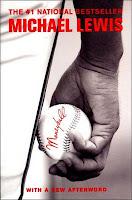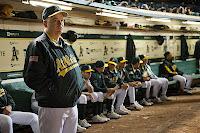
View Trailer!
View Pitt interview with clips on Charlie Rose
Depth: 5
Acting: 4.5
Plot: 5
Originality: 5
Entertainment: 5
Demand on Viewer: Mild-Moderate
Overall: Highly Recommended

A relevant and timely premise: what to do about making due? With little resources, and against the establishment belief that the Oakland Athletics are all but a minor league farm team, General Manager Billy Beane (Pitt) is compelled by a passion for baseball and winning to redraw the map. He recruits a shy, pudgy Yale-graduated economist named Peter Brand (played very skillfully by Jonah Hill, whose amusing stoic face is a nice foil for Pitt). Together they pour over the statistical data in hopes of understanding how to maximize his lower-tier recruits. He fields a team of individuals who cannot hit or field as well as any single player recruited by wealthier teams such as New York or Boston. Beane expects that as an aggregate they can beat the odds (a bit like predicting overall traffic patterns in a city without knowing what any individual driver may do.)
 So far sounds like a snoozer—something for only "backwards-K" scoring junkies—but be reassured, the film skillfully avoids becoming top-heavy with stats. Indeed, this is one of Moneyball's most remarkable qualities, that it lifts out of this potentially boring subject a deep and lively story about human choices, with plenty of good solid competitive sport sprinkled in for fun. Credit goes to director Bennett Miller and the author of the book on which the movie is based, Michael Lewis.
So far sounds like a snoozer—something for only "backwards-K" scoring junkies—but be reassured, the film skillfully avoids becoming top-heavy with stats. Indeed, this is one of Moneyball's most remarkable qualities, that it lifts out of this potentially boring subject a deep and lively story about human choices, with plenty of good solid competitive sport sprinkled in for fun. Credit goes to director Bennett Miller and the author of the book on which the movie is based, Michael Lewis.Start with passion: the gravitational pull of the old way requires a healthy dose of it. Beane has plenty, and it comes out in endearing and idiosyncratic ways: shoving twinkies and popcorn down his throat between phone calls, clicking the game on and off as he pays attention from a distance, wheeling his truck around empty lots trying to clear his head. The most interesting form his passion takes is in the scenes with other people, as he tries to cajole, reason, push, and joke his way around them. A memorable example comes in a locker-room display, when the team, shocked into silence, hears Beane say, "THAT is what losing sounds like."

The opening draft meeting rings true immediately, as a group of seasoned older men tut-tut Beane. Having been in this position myself frequently as a pastor (dreaded "council meetings"), I recognize a universal archetype here: the individual against the (older) institution. There are human tensions created by that relationship that cross all businesses, organizations, and causes. Near the end of the film another team owner expresses this sentiment very powerfully. That dialog is worth the price of the film, and watching through to that moment promises to be very satisfying.

Against this backdrop and giving the story its profound originality is Beane's relationship to his daughter. He has made choices in his past based on money; now he must come to a different place. The way the film interweaves his own history in baseball with his decisions about his daughter is truly unique. Here is an archetype: a man reflects on past failures and realizes who he is. No tearful scenes, but for those men who recognize their own story, there may be moist eyes.
 The performances by Pitt and Hoffman (A's coach Art Howe) are good, though not among their best partly because they have set the bar so high previously. Fortunately they both have the maturity and gravitas to carry off the roles. The movie does suffer a little from their notoriety: one keeps thinking, "That's not Billy Beane, that's Brad Pitt!" However, without their names on the cover, the story might have suffered what the Oakland A's did: de facto relegation to the minors because of lower visibility.
The performances by Pitt and Hoffman (A's coach Art Howe) are good, though not among their best partly because they have set the bar so high previously. Fortunately they both have the maturity and gravitas to carry off the roles. The movie does suffer a little from their notoriety: one keeps thinking, "That's not Billy Beane, that's Brad Pitt!" However, without their names on the cover, the story might have suffered what the Oakland A's did: de facto relegation to the minors because of lower visibility. I recommend this film particularly for anyone in a position of leadership or management (the way Beane has to climb all the way down the ladder and understand his players is instructive), and anyone trying to navigate the sometimes impossible straits of family vs. career. Several metaphors, including an especially vivid about one trying to get past first base, highlight these themes in a way everyone can understand and relate to.
I recommend this film particularly for anyone in a position of leadership or management (the way Beane has to climb all the way down the ladder and understand his players is instructive), and anyone trying to navigate the sometimes impossible straits of family vs. career. Several metaphors, including an especially vivid about one trying to get past first base, highlight these themes in a way everyone can understand and relate to.Moneyball has moreover something very salient to say to a culture obsessed with both money and sports. As we follow Beane's story, we are led to face several truths about money. It needs to be understood and reckoned with as a controlling force, but ultimately we are free to choose beyond it. Money and sports are only the tip of the iceberg. What does any of this mean? is Billy Beane's question, and one we could benefit from asking more often.
